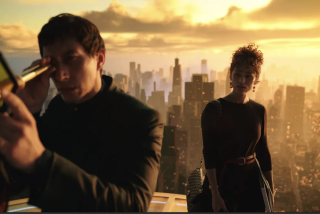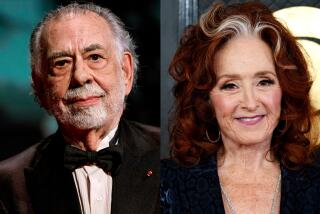‘Hearts of Darkness’: The Director as Megalomaniac
This is the summer for first-rate documentaries to enter the home-video market. First the Maysles Brothers’ great “Gimme Shelter,” showing the events leading to a murder at a Rolling Stones concert, and now Eleanor Coppola’s “Hearts of Darkness: A Filmmaker’s Apocalypse,” her absorbing behind-the scenes account of the filming of husband Francis Ford Coppola’s 1979 classic, “Apocalypse Now.”
This film has taken a strange route to home video, first appearing on cable TV (Showtime) last fall, then showing up in theaters. Like most documentaries, it had only limited theatrical release and, despite making some year-end best-10 lists, didn’t have a wide audience.
Documentaries rarely do well on video either, but there are high expectations for this Paramount release. It should get a boost from its reputation as the best, most honest look at the making of a movie. Hollywood insiders, though, love the film (as much as rock music aficionados love “This Is Spinal Tap”) because it accurately shows that the director of a big expensive film has to be part megalomaniac.
Coppola’s wife captured all the headaches of this marathon production, shot in the late ‘70s in the Philippines. The film went may over budget because of a string of catastrophes, including a typhoon, Martin Sheen’s heart attack, Marlon Brando’s eccentricities and endless script problems.
“It’s a miracle that it was ever made,” said Eleanor Coppola. “I just shot everything in front of me that interested me.” She wound up with 60 hours of film and 40 hours of audio tape.
She wasn’t a trained filmmaker and got this assignment by default. “Francis needed someone to film five minutes of location footage for a promotional film,” she said. “He didn’t want a documentary team hanging around and I was handy so he asked me to do it, though I had no experience. I learned as I went along.”
But the promotional film was never made and all that film ended up in storage. It stayed there until filmmakers Fax Bahr and George Hickenlooper implored the Coppolas to allow them to fashion it into a documentary. “Francis said they could do it if they could find funding and if he could have the final cut,” she recalled. Eventually Showtime agreed to finance the project.
What’s her husband’s feeling about the documentary?
“It brought back a lot of powerful memories for him--some pleasant and some unpleasant,” she said.
The big question, though, is why he allowed the inclusion of segments showing him in unflattering moments. “He said because it’s the truth,” she replied. “He has always championed the truth and letting filmmakers make the kind of films they want. He had to be true to his ideals. That’s the way he is.”
The acclaim hasn’t turned Eleanor Coppola into a filmmaker. Her reply to the endless questions about her next film: “I don’t see myself as a filmmaker. I’m involved in creative activities, like designing costumes for a dance company, writing articles and writing another book. It’s doubtful that I’ll make another film.”
* Upcoming on Video: “Wayne’s World” (Wednesday), “Medicine Man” (Aug. 19), “White Men Can’t Jump” (Aug. 20), “Fried Green Tomatoes” (Aug. 20), “Final Analysis” (Aug. 26) and “The Lawnmower Man” (Aug. 26).
More to Read
Only good movies
Get the Indie Focus newsletter, Mark Olsen's weekly guide to the world of cinema.
You may occasionally receive promotional content from the Los Angeles Times.










